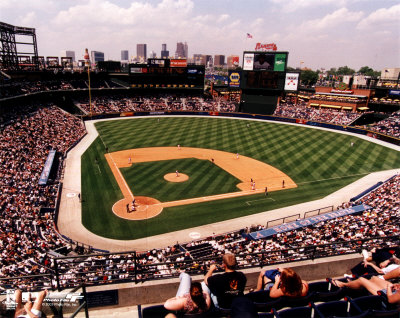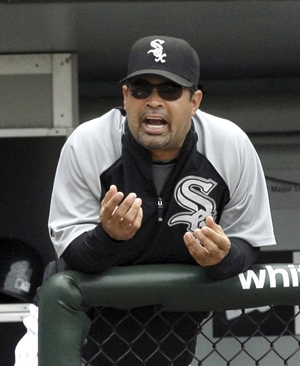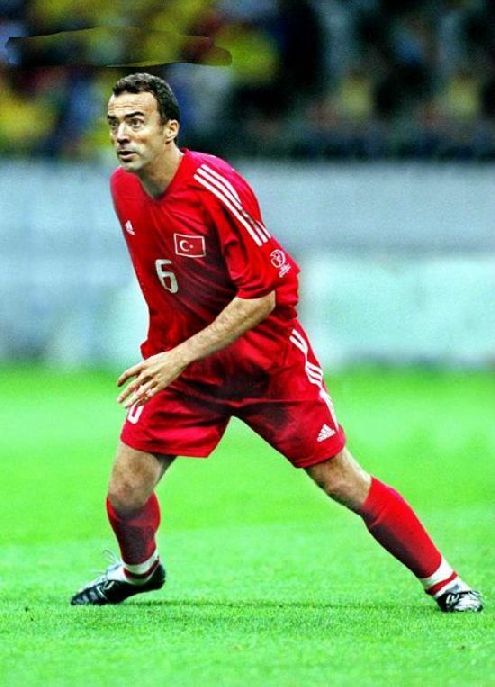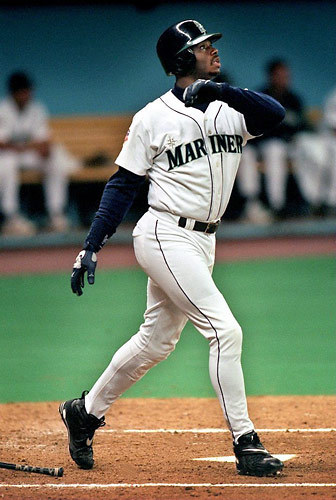A fond farewell to Ken Griffey Jr.
Last night was one of those perfect storms of sports news that happens every month or so.
Armando Galarraga’s perfect game was ruined on the 27th out by a controversial call by umpire Jim Joyce.
Game 3 of the Stanley Cup final went into overtime, with a goal being called back after the puck miraculously rolled across the crease. The no-goal was after National Hockey League Commissioner Gary Bettman got cantankerous with Ron MacLean during the second intermission of Hockey Night in Canada.
But what I’ll always remember about June 2nd 2010 is that Ken Griffey Jr. retired.
As I’ve written before, Griffey was my favourite baseball player growing up.
In his prime he was the best fielder and hitter in the game. In a time when professional athletes develop chips on their shoulders, become arrogant or act out, Griffey remained fun-loving and grounded.
His statistics speak for themselves. Griffey accumulated 630 home runs, the fifth-most in baseball history. He has 2781 hits, 1836 RBIs and a career batting average of .284. Hall of Fame numbers to be sure.
Griffey’s best season was undoubtedly 1997 when he won the American League MVP with the Seattle Mariners. That year he hit .304 while reaching career highs with 56 home runs and 147 RBIs.
As impressive as his numbers are, Griffey will always have the aura of unfulfilled potential. Not because he lacked effort, but because he never played in a World Series, even though his Seattle Mariners had a host of talent including Alex Rodriguez, Randy Johnson and Edgar Martinez.
Because he moved to the Cincinnati Reds, a team that has struggled throughout the 1990s and 2000s, he missed out on further playoff opportunities, including two more American League Championship appearances by Seattle in 2000 and 2001.
Nagging injuries forced Griffey to miss prime years of his career. Between 2002 and 2004 he hit a total 41 home runs while playing in only 206 games over those three seasons.
Although Griffey was great, arguably the best of an entire generation of ballplayers, it will always seem as though he might have had still had some untapped potential.
Despite those lost years, Griffey’s career represents an ideal trajectory that in a perfect world all athletes would follow.
Griffey was a genuinely good guy. Griffey knew he was going to be traded from Seattle in 2000, so he asked to be sent to his hometown Cincinnati Reds, the team his father played for in their Big Red Machine glory days. Given the opportunity to abandon the Reds in favour of a bigger salary with the New York Yankees, Griffey took a smaller contract to stay near his family.
He can also be judged for what he didn’t do. In an era where players like Mark McGwire are being held out of Baseball’s Hall of Fame for their connection to performance enhancing drugs, Griffey remains a first-ballot shoe-in because he’s never been connected to any kind of steroid use.
Although Griffey was a shadow of his former self in his final years with the Reds, Chicago White Sox and again with the Mariners, his legacy on and off the field is exemplary of what all baseball players could be – a role model off the field who actually produces incredible numbers.
Griffey will be missed as player, but he will always have a place in baseball.
Let’s try a little positivity…

One of the things I love about baseball is the relaxing atmosphere of afternoon games, particularly when broadcast from Turner Field on Peachtree TV.
I’m reading Sports Illustrated’s Great Baseball Writing and I’ve learned something from the various essays and articles in the volume – the great American pastime is always in a state of hand-wringing about the State of the Game.
Think about it. At the turn of the 20th century there was great concern over the hoodlums who played the game. The 20s were marred by gambling scandals, primarily the one revolving around the Chicago White Sox and the 1919 World Series. After that was World War II, segregation, integration, labour strife and, most recently, steroids.
There’s always a new problem plaguing the sport.
In all that doom and gloom there isn’t enough talk about what makes baseball great. I’m as guilty of this pessimism as the next person. This season alone I’ve taken shots at my hometown Toronto Blue Jays, complained about lengthy games and weighed-in on Joe Cowley and talk of moving the Jays.
So let’s get positive. Let’s talk about three things that I love about baseball.
1) Afternoon Games
Nobody likes to work during the summer. It’s a drag. Everyone would much rather be outside, enjoying the sun. Unfortunately, employment is a necessary element of being a part of today’s society.
However, baseball matinees can provide some respite from the drudgery of work. Following the game on the radio, on TV or on the Internet is always a pleasant distraction from a job.
A particular favourite of mine is to follow the Atlanta Braves on Peachtree. Their announcers are laid back and the fans at Turner Field are great. It’s always relaxing and fun to watch.
2) Tradition
I really enjoy the little social behaviours that surround baseball games. Waiting for the half inning to return to your seat after a trip to the concession stand. Judging a person’s character based on whether or not they use the real pitcher’s rubber during the opening pitch. Singing, stretching and dancing during the seventh inning stretch. They’re all good.
A particular favourite is the habit of Torontonians to boo any opposing team that dares to have a mound meeting or try to pick-off a runner. No matter what the situation, Jays fans go nuts at the very thought of another team trying to invoke strategy.
3) The Fans
Baseball fans can’t compete with other sports’ supporters in terms of passion or intensity, but they are definitely smarter. Hockey fans, as much as I love ‘em, are basically only capable of three sounds – boo, cheer and Go <team name> Go! The rest of the game is spent in a fixed state of concentration. Football and basketball fans are much the same.
However, baseball fans sing songs together, come up with chants, and best of all heckle. No matter where they’re sitting in a stadium they will yell at the top of their lungs lengthy diatribes on their target’s short-comings as a player.
Their knowledge of bench players and opposing teams runs deep too, with many fans citing the personal lives of the athlete. Remember when it was rumoured that Alex Rodrgiuez was stepping out on his wife with Madonna? Good times. Truly, a golden age of heckling.
Tempest in a tea pot: thoughts on the Joe Cowley controversy

Chicago White Sox manager Ozzie Guillen was the voice of reason in the Joe Cowley controversy? Weird.
Last Thursday the Toronto sports blogosphere was aflame with controversy over a web article written by Chicaco Sun-Times beat reporter Joe Cowley titled “No, Canada, for MLB”. In short, it was about how the Blue Jays are a moribund franchise that should be moved.
As a Torontonian - born and bred -I had a very strong, knee-jerk reaction to reading this. After all, who is this guy? I don’t know him from Adam. Doesn’t he know that we’re the centre of the universe?
Reading Cowley’s Wikipedia profile did little to mitigate my rage. I mean, who wouldn’t be inflamed when he “protests” Canada by refusing to stand during the national anthem? The two incidents make him appear ignorant and ethno-centric.
However, after a day or two of reflection I calmed down. After all, Cowley clearly didn’t know what he was talking about. He was probably just trying to get a reaction from loyal Blue Jays fans.
This morning, Cowley appeared on the Fan 590’s Big Early with Don Landry and Gord Stelleck where he defended himself admirably, pointing out that his infamous remark that Toronto was “nothing but a city in a third-world country” was taken out of context.
However, Cowley stuck to his guns and reiterated his belief that the Blue Jays should be moved. He re-stated his beliefs that Venezuela deserves a team and that, aside from political reasons, it would work in Caracas, the capital of the country.
Cowley had addressed this idea in his article, with supporting quotes from White Sox manager Ozzie Guillen and pitcher Freddy Garcia. Both Venezuelans spoke about how popular a team would be in Caracas.
That’s entirely fair comment. It would be popular. Economically viable? No. Politically possible? No. Safe? Not even a little. But boy, there would be crowds.
Ask any Winnipeg Jets supporter – drawing a crowd isn’t enough. You need the backing of a strong business community. Caracas lacks that kind of legitimate financial support.
Also, let’s consider who he asked – two proud nationalists who, as fans, would undoubtedly love to see a major league team in their country. I can entirely sympathize. As a Canadian I love having a Major League Baseball franchise in my country, and am sorry that Montreal lost the Expos.
Hell, if my heart had its way every major Canadian city would be represented in the National Hockey League and MLB. It just isn’t a realistic desire.
It’s worth noting that neither Guillen or Garcia said that the Jays should be moved there or that the Toronto franchise should be moved at all. They just said that they’d like a team in Venezuela.
Guillen did speak about how the dwindling fan support, compared to the Jays dynasty of the early 1990s, is a sad state of affairs. Again, I agree. It is sad. But the White Sox manager never explicitly said that the team should be folded or relocated. He was just commenting on the rather pathetic attendance figures.
As for Rios’ and his claim that “There's that small group of diehards, but it’s hockey, hockey, hockey. It’s gotten sad here. They just don’t really care.” It’s hard to believe that he doesn’t have some resentment toward Toronto after he was put on waivers by the Blue Jays last season.
Jays fans certainly don’t like him: he had been booed during each of his at-bats over the course of the four-game series.
At the end of the day, I think Cowley’s article reads like a combination of someone with an agenda to push and someone looking for some cheap heat, trying to get a rise out of a beleaguered fan base to generate some hits for his web presence.
In all honesty, I’m sorry to have wasted 639 words on this “news”. Cowley’s already gotten enough attention for his ill-considered article.
The World Cup should be watched with a grain of salt

Turkey's Arif Erdem, shown here during his playing days for the national team, was arrested two weeks ago for his alleged involvement in match-fixing.
Although the playoffs (hockey and/or basketball, take your pick) still sit between us and the summer, the Canadian Broadcasting Corporation has already begun to promote their coverage of this year’s World Cup of Soccer in South Africa.
There’s a growing an air of excitement surrounding the tournament. After all, it’s the biggest sporting event in the world, even more popular than the Olympics.
Unfortunately, this time around I’m going to be watching the World Cup with a pretty sceptical eye.
My disillusionment began in Dec. 2008 as I read Declan Hill’s The Fix, an investigation into the world of sports fixing by a journalist who used to work with the CBC and the British Broadcasting Corporation.
I reviewed the book on my now defunct blog, but in short: Hill uncovered a far-reaching criminal underworld that exerts its influence over many sporting events. Hill chose to focus his investigation on soccer matches and his findings were startling.
According to him, there are two kinds of match-fixing scenarios.
1) Internal – When a member of a team gives incentives to officials or the players on opposing clubs to give his team an advantage.
Author Joe McGinniss details this kind of fix in The Miracle of Castel Di Sangro when he overhears several players discussing throwing their final game of the season against Bari. They had been asked to do this “favour” to insure that Bari would be promoted to Serie A.
2) External – When an outsider influences the outcome of a match for personal gain.
Obviously, this is the more typical kind of sporting corruption, with the Black Sox scandal, when the Chicago White Sox threw the 1919 World Series at the behest of Arnold Rothstein, serving as a sterling example.
In The Fix, Hill uncovers evidence of many professional matches being thrown world-wide. The climax of the book is when a mobster assures him that the World Cup itself is fixed. The gangster predicts the results of a handful of matches, down to when the goals are scored.
Hill watches with growing horror as each one of the games ends just as described.
Why is this pertinent now? Because last November German police arrested 15 people for fixing more than 200 games. Two weeks ago, Turkish police detained 40 people, including former international Arif Erdem, for their involvement in thrown matches.
Germany’s Bundesliga and Turkey’s Süper Lig are not the best professional soccer league’s in the world, but they are hardly fly-by-night organizations. In fact, the German national team is one of the best sides in the world and a contender for the 2010 World Cup.
With all this in mind, it will be hard to not be cynical when one of the favourites struggles against an opponent this summer. I simply can’t help but be a little jaded after reading The Fix and hearing about recent events in European soccer.
